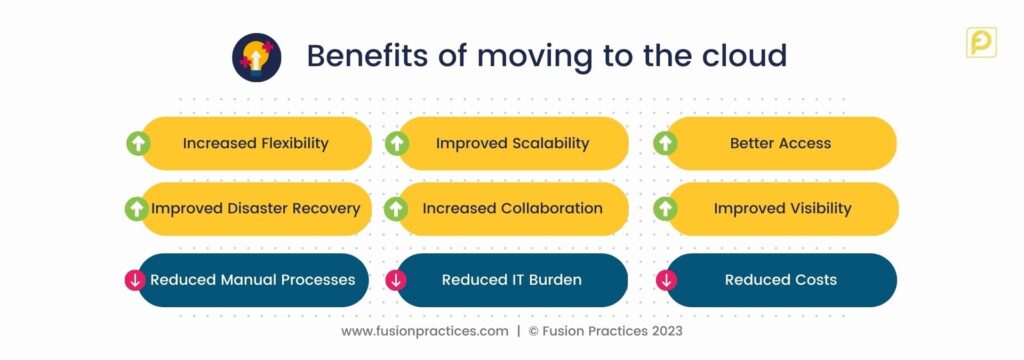There are several reasons for moving from the legacy ERP platform to a cloud solution. We have put together 13 reasons that can be used for forming a business case for implementing a new system to move to cloud.

Unsupported legacy platform
Running an older version of ERP and the cost of the upgrade on-premise can almost be the same as implementing a new ERP system on the cloud.
Technical debts
May support company strategy to align to cloud and for removal of technical debt
Reducing manual processes such as excel spreadsheets
If you have many processes manually on excel spreadsheets, those processes could happen directly within the ERP system. Preparing data required for management information packs, financial, operational reports, regulatory submissions and journals in the GL often are prepared manually and then distributed to the relevant stakeholders. A well implemented ERP system could help removal of such manual processes.
Improved visibility
Gain better insights with embedded and real time analytics. Powerful and flexible ERP Analytics delivers personalized application analytics and data-driven insights powered by machine learning. Most enterprises operate in a hybrid landscape with a diverse set of applications. customers can get 360-degree insights across all data sources
Compliance
Cloud-based ERP providers are often compliant with industry regulations and standards, making it easier for companies to meet compliance requirements.
Scalability
Cloud-based ERP systems can easily scale up or down as the company’s needs change, without the need for additional hardware or IT resources.
Increased collaboration
Cloud-based ERP systems typically include built-in collaboration features, making it easier for employees to share information and work together in real-time.
Cost savings
Cloud-based ERP systems typically have a lower total cost of ownership, as companies do not have to invest in and maintain expensive hardware.
Flexibility
These systems can be accessed from anywhere with an internet connection, allowing employees to work remotely or from multiple locations.
Mobile access
Many cloud-based ERP systems offer mobile access, which allow employees to access the system from their mobile devices.
Automatic updates
Cloud-based ERP systems are typically updated automatically by the vendor, ensuring that the system is always up-to-date with the latest features and security enhancements.
Reduced IT burden
Migrating to the cloud allows companies to offload the burden of maintaining and updating the ERP system to the cloud provider, freeing up IT resources to focus on other projects.
Improved disaster recovery
Cloud-based ERP systems typically have built-in disaster recovery and business continuity features, which can minimize data loss and minimize downtime in case of an emergency.
After the decision is made for moving to a Cloud ERP, the next obvious decision is to decide an ERP most suited to your needs amongst Oracle, Workday, SAP, Unit4, Netsuite and a few others. Comparisons will be part of future articles.




